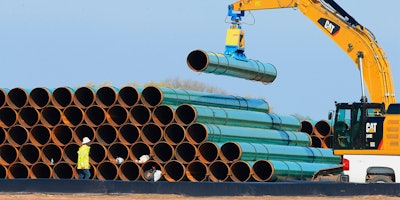
TRENTON, N.J. (AP) — The environmental impacts of a proposed $1.2 billion natural gas pipeline from northeastern Pennsylvania to New Jersey would be "effectively limited," federal regulators said Friday.
The Federal Energy Regulatory Commission issued its final environmental impact study for the 120-mile (193-kilometer) PennEast pipeline and outlined several areas of concern, including trace amounts of arsenic in some rocks the pipeline would cross and potential threats to endangered and threatened species, including the bog turtle and Indiana bat.
But the report says PennEast is proposing mitigation efforts such as well monitoring and avoiding endangered animal habitats.
"We conclude that the cumulative impacts associated with the project, when combined with other known or reasonably foreseeable projects, would be effectively limited," the report said.
The report comes after Republican President Donald Trump advanced the Keystone XL and Dakota Access oil pipeline projects, which had become battles in a bigger political fight over environmental concerns.
The PennEast project is fiercely opposed by environmental groups who say it would irreversibly damage the landscape. New Jersey Sierra Club director Jeff Tittel called the report a "sham."
The Federal Energy Regulatory Commission "has shown they are nothing but a front for the gas industry that they're supposed to regulate," Tittel said.
A commission spokeswoman declined to respond because the matter is pending before the panel.
PennEast spokeswoman Pat Kornick praised the report and says it's the final major federal regulatory hurdle.
The next step for the project would be for the commission to determine whether there's a need for the project, which would amount to a federal green light for the pipeline. That step could be delayed because the commission lacks the quorum required to vote on such approvals.
Permits are also still pending with the New Jersey Department of Environmental Protection.
PennEast hopes for the pipeline to be operational in the second half of 2018, according to Kornick.
The pipeline would originate in Dallas, Pennsylvania, and end at near Pennington, New Jersey.






















